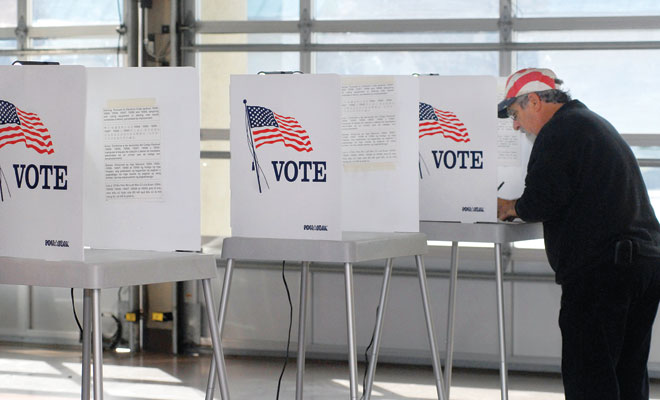Californians overturned a state Supreme Court decision in a
historical move that writes a ban on gay marriage into the state
Constitution, while other bond measures proposed during a weakening
economy were defeated or struggled with a narrow lead.
Californians overturned a state Supreme Court decision in a historical move that writes a ban on gay marriage into the state Constitution, while other bond measures proposed during a weakening economy were defeated or struggled with a narrow lead.
The outcome of the same-sex marriage ban dominated the list of ballot initiatives faced by California voters, with proponents saying religious liberty and the building blocks of society were at stake. Opponents called Proposition 8 a civil rights battle, that tested the American ideals of equality and personal freedom. By Wednesday morning, with 96.4 of precincts reporting, the measure appeared to be passing with 52 percent.
Proposition 4, another divisive social issue that would require doctors to notify parents or guardians when minors seek an abortion, appeared to be headed for defeat. California voters defeated similar initiatives twice before, in 2005 and 2006.
Other initiatives asked voters to decide questions about alternative energy, crime, agriculture conditions, public transportation and gerrymandered political districts.
Two alternative energy initiatives that were rejected by environmental groups were defeated.
Proposition 7, which would have required California utilities to generate half their electricity from renewable sources by 2025, was defeated with 66 percent of voters rejecting the measure with half the ballots tallied. Another energy measure, Proposition 10, would have given Californians who buy alternative-fuel vehicles up to $50,000 in rebates through a $5 billion bond measure – but it also lost.
With a 51 percent lead, voters appeared to be narrowly supporting Gov. Arnold Schwarzenegger’s effort to remove the Legislature’s power to draw state Assembly, Senate and Board of Equalization districts. Proposition 11 would give that authority to a 14-member, bipartisan commission.
Proposition 2, the Standards for Confining Farm Animals Act, passed. With nearly three quarters of the votes tallied, 62 percent of voters supported the measure.
The measure drew some high-profile backers, including Ellen DeGeneres and wife Portia de Rossi. The initiative sought to outlaw cramped cages for egg-laying chickens, but opponents said it would drive egg producers out of state if approved.
Two initiatives vowed to get tough on criminals while another sought to expand drug treatment programs.
Proposition 5 would have prevented drug offenders from being sent back to prison for parole violations unless they commit a new felony or are considered high risk, while Proposition 6 called for a greater crackdown on gang crime. Both measures failed.
Proposition 9, an initiative that will write crime victims’ rights into the state Constitution, passed.
Several other initiatives called for billions in bond money. Proposition 1a called for raising nearly $10 billion for building the first phase of a statewide high-speed rail system, while Proposition 3 sought to tap the state’s budget for $980 million to fix and equip children’s hospitals. With three quarters of the precincts counted, both had a narrow lead.
Proposition 12, which would continue a state-run home loan program for veterans, passed.










